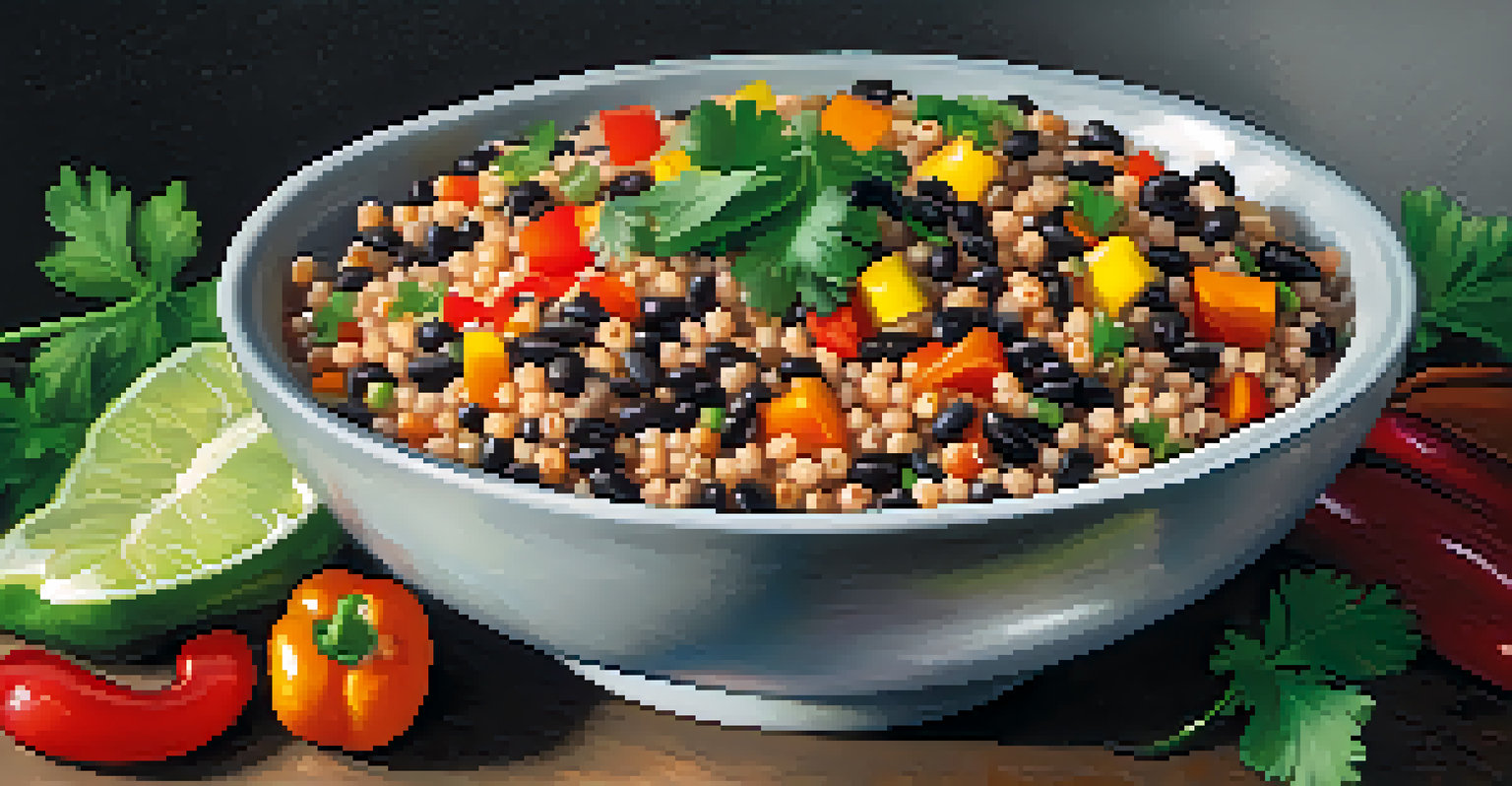Vegetarian Diets: A Pathway to Lower Cholesterol Levels

Understanding Cholesterol and Its Impact on Health
Cholesterol is a waxy substance found in your blood, and while your body needs it to build healthy cells, too much cholesterol can lead to health issues. High cholesterol levels can increase the risk of heart disease and stroke, making it crucial to manage your intake. There are two main types of cholesterol: LDL (low-density lipoprotein), often termed 'bad' cholesterol, and HDL (high-density lipoprotein), known as 'good' cholesterol.
Let food be thy medicine and medicine be thy food.
Diet plays a significant role in controlling cholesterol levels, and this is where vegetarian diets shine. By focusing on plant-based foods, individuals can consume less saturated fat, which is often found in animal products. This dietary shift can be a simple yet effective strategy to lower LDL levels and promote heart health.
Moreover, adopting a vegetarian diet doesn't just help in lowering cholesterol; it also encourages a broader range of health benefits. Studies have shown that vegetarians tend to have lower blood pressure, a healthier weight, and improved blood sugar levels, all contributing to a healthier cardiovascular system.
Key Components of a Heart-Healthy Vegetarian Diet
A heart-healthy vegetarian diet is rich in fruits, vegetables, whole grains, legumes, nuts, and seeds. These foods are packed with essential nutrients and fiber that help reduce cholesterol absorption in the body. For instance, oats and beans are excellent sources of soluble fiber, which can help lower LDL levels significantly.

Incorporating healthy fats, such as those found in avocados, olive oil, and nuts, is also vital. These fats can improve HDL cholesterol levels and provide necessary energy for daily activities. This balance of nutrients is essential for anyone looking to improve their cholesterol levels while enjoying delicious and satisfying meals.
Cholesterol Types Matter
Understanding the difference between LDL and HDL cholesterol is crucial for managing heart health.
Additionally, spices like turmeric and garlic have been shown to have cholesterol-lowering properties. So, not only can you enjoy tasty meals, but you can also boost your heart health with simple additions to your diet.
The Role of Fiber in Lowering Cholesterol
Fiber is a superstar when it comes to heart health, particularly soluble fiber. Found in foods like oats, beans, and fruits, soluble fiber binds with cholesterol in the digestive system, helping to remove it from the body before it can enter the bloodstream. This process can significantly lower LDL cholesterol levels when included in a regular diet.
The greatest wealth is health.
For those following a vegetarian diet, reaching the recommended fiber intake is often easier. Plant-based foods are typically high in fiber, which not only aids in cholesterol management but also promotes digestive health and can help maintain a healthy weight. A simple switch to whole grains instead of refined grains can make a big difference in fiber intake.
Incorporating a variety of fiber-rich foods into your meals can turn eating into an enjoyable experience. Think of mixing black beans into a salad or enjoying a bowl of oatmeal topped with fresh fruit; these delicious options can contribute to heart health and lower cholesterol levels seamlessly.
Healthy Fats: Good vs. Bad Cholesterol
Understanding the difference between good and bad fats is crucial for managing cholesterol. While saturated fats, often found in animal products, can raise LDL cholesterol, unsaturated fats can help increase HDL cholesterol and lower overall heart disease risk. For vegetarians, sources of healthy fats include avocados, nuts, seeds, and olive oil.
Incorporating these healthy fats into your meals doesn't have to be complicated. For example, using olive oil as a dressing or cooking oil, snacking on nuts, or adding avocado to a sandwich can enhance both flavor and health benefits. These small changes can lead to significant improvements in cholesterol levels over time.
Plant-Based Diet Benefits
Adopting a vegetarian diet can significantly lower cholesterol levels and improve overall heart health.
It's also important to be mindful of trans fats, which are often found in processed foods. These unhealthy fats can increase LDL cholesterol and lower HDL cholesterol, so it's best to avoid them altogether. By focusing on whole, plant-based foods, you can naturally steer clear of trans fats while enjoying a heart-healthy diet.
The Benefits of Plant-Based Proteins
Plant-based proteins are not only nutritious but can also help lower cholesterol levels. Foods like lentils, chickpeas, and quinoa are excellent sources of protein that are low in saturated fat. Replacing animal proteins with these plant-based options can lead to a healthier heart and improved cholesterol levels.
For instance, a hearty lentil soup or a chickpea salad can provide all the protein you need while keeping your cholesterol in check. Plus, these dishes are often packed with additional nutrients such as fiber and antioxidants, further supporting heart health.
Transitioning to plant-based proteins may seem daunting, but it's easier than it sounds. Starting with one or two meatless meals a week can help you gradually introduce these healthy options into your diet and discover new flavors along the way.
Real-Life Success Stories: Lowering Cholesterol Through Diet
Many individuals have successfully reduced their cholesterol levels by adopting a vegetarian diet. Take the story of Sarah, who, after struggling with high cholesterol for years, decided to switch to a plant-based diet. Within six months, her cholesterol levels dropped significantly, and she felt more energetic than ever.
Sarah's journey highlights the potential of vegetarian diets as a powerful tool for heart health. By focusing on whole foods and minimizing processed options, she was able to enjoy a variety of delicious meals while still achieving her health goals. Her experience serves as inspiration for others considering a similar dietary change.
Fiber's Role in Heart Health
Incorporating fiber-rich foods into your diet can help reduce LDL cholesterol levels and support digestive health.
Like Sarah, countless people have shared their success stories online, showcasing how a vegetarian diet can lead to improved health outcomes. These real-life examples can motivate others to explore the benefits of plant-based eating and its positive impact on cholesterol levels.
Getting Started on Your Vegetarian Journey
Embarking on a vegetarian diet can feel overwhelming at first, but it doesn't have to be. Start by gradually incorporating more plant-based foods into your meals and exploring new recipes that excite you. Consider setting a goal, like 'Meatless Mondays,' to ease into the transition and make it a fun challenge.
Experimenting with different cuisines can also keep your meals interesting. From hearty Indian lentil dishes to fresh Mediterranean salads, the options are endless. Finding inspiration from cookbooks or online platforms can help you discover new favorites that align with your health goals.

Remember, every small change counts. Whether it’s swapping out a meat-based meal for a vegetarian option or trying a new vegetable, each step you take can contribute to lower cholesterol levels and a healthier lifestyle.